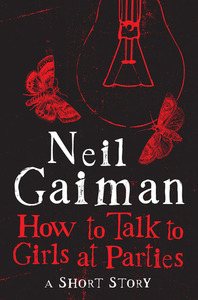Take a photo of a barcode or cover
Superb storytelling as always, this is one of many reasons I adore Neil Gaiman. In this story imagine going to a house party, and as a boy who has not hook up with a girl, let alone scored, meeting girls that seemed like "out-of-towners" and having the chance to talk to them and leading to "hook-ups" think again. At first I thought that it might be a mundane coming of age story by Gaiman, but as usual his fantasy storytelling will get you as you turn the pages, going deep into the story. I laughed a little as it caught me by surprise, and this was since Joe Hill's [b:20th Century Ghosts|373915|20th Century Ghosts|Joe Hill|https://d202m5krfqbpi5.cloudfront.net/books/1348772179s/373915.jpg|1049073] one of the weird and almost scary short story I've read this year (Joe Hill and his Dad Stephen King also got me last year with their novella from Esquire magazine).
This also came with an excerpt from his new book [b:The Ocean at the End of the Lane|15783514|The Ocean at the End of the Lane|Neil Gaiman|https://d202m5krfqbpi5.cloudfront.net/books/1351914778s/15783514.jpg|21500681] which I skipped for I wanted to read the whole thing once I get my hands on it. Also both works have really long titles.
This is my second stand alone short story that I have read this Short Story Month, the other was [b:Fox 8: A Story|17620753|Fox 8 A Story|George Saunders|https://d202m5krfqbpi5.cloudfront.net/books/1364467047s/17620753.jpg|24587486] .
This also came with an excerpt from his new book [b:The Ocean at the End of the Lane|15783514|The Ocean at the End of the Lane|Neil Gaiman|https://d202m5krfqbpi5.cloudfront.net/books/1351914778s/15783514.jpg|21500681] which I skipped for I wanted to read the whole thing once I get my hands on it. Also both works have really long titles.
This is my second stand alone short story that I have read this Short Story Month, the other was [b:Fox 8: A Story|17620753|Fox 8 A Story|George Saunders|https://d202m5krfqbpi5.cloudfront.net/books/1364467047s/17620753.jpg|24587486] .
“— Não se ouve um poema sem que ele mude você — respondeu ela. — Eles o ouviram, e o poema os colonizou. Ele os possuiu e os habitou, seu ritmo se tornando parte do modo como pensavam; suas imagens mudando para sempre as metáforas deles; seus versos, suas perspectivas, suas aspirações se tornando a vida deles. Na geração seguinte, as crianças já nasceram conhecendo o poema, e, de uma hora para outra, como costuma acontecer, mais nenhuma criança nasceu. Não havia mais necessidade delas. Tudo o que havia era um poema, que se vestiu de carne e se espalhou pela vastidão do conhecido.”
Queria tanto que fosse mais desenvolvido do que apenas algumas páginas!
Entretanto, uma graça de conto, com uma fala incrivelmente linda.
Queria tanto que fosse mais desenvolvido do que apenas algumas páginas!
Entretanto, uma graça de conto, com uma fala incrivelmente linda.
dark
lighthearted
medium-paced
Plot or Character Driven:
N/A
Strong character development:
No
Loveable characters:
No
Diverse cast of characters:
Yes
Flaws of characters a main focus:
Complicated
Undoubtedly, Neil Gaiman writes beautiful prose. Though the story is interesting, I sometimes wonder if Gaiman doesn't take too much enjoyment in his own cleverness for my taste, as he seems to delight in leaving more questions than answers. A quick read, if a puzzling one.
Vi muchas pelis y series de Neil Gaiman y me encantaron, así que hace mucho que quería leer algo suyo. Fue cuando vi la peli basada en este cuento y que me enteré de ese hecho que dije: "Tengo que leer esto". Bueno, cada uno tiene una trama —y conforma una experiencia— totalmente distinta a la del otro: mientras que la peli dice mucho más y va más por el lado de lo bizarro, el romance y la ciencia ficción, el cuento dice mucho menos y es más misterioso. Ambos, a su manera, fueron muy bellos y entretenidos.
PD.: Encima leí el cuento con el audiolibro narrado por Neil Gaiman y fue TREMENDO. Y el muy amable tiene ambas cosas gratis en su página oficial
PD.: Encima leí el cuento con el audiolibro narrado por Neil Gaiman y fue TREMENDO. Y el muy amable tiene ambas cosas gratis en su página oficial
I love him. I love this. I love the words and the art and the paper.
I vaguely decided to save money on this trip by not buying anymore clothes. I didn't even blink at purchasing a new Gaiman.
I vaguely decided to save money on this trip by not buying anymore clothes. I didn't even blink at purchasing a new Gaiman.
"I will never forget that moment, or forget the expression on Stella's face as she watched Vic hurrying away from her. Even in death I shall remember that. Her clothes were in disarray, and there was makeup smudged across her face, and her eyes-You wouldn't want to make a universe angry. I bet an angry universe would look at you with eyes like that."
In "How to Talk to Girls at Parties" which was nominated for the 2007 Hugo Award for Best Short Story and won the Locus Award for Best Short Story, Gaiman conjures up an eerie coming of age story that is not only about the differences between the sexes (men viewing women as foreign creatures or "aliens") but could also be read as a parable for how to treat girls (i.e. don't take advantage of them because, because after all, you wouldn't want to make the universe angry). It is also a great story that investigates (like so many stories from Gaiman have a tendency to do) childhood memory and the loss of childhood innocence through the lens of the fantastical.
The story is pretty simple. It is about a couple of British 1970s teen-aged boys, Enn and Vic, who go to a party to meet girls, only to find that the girls are very different from the boys' expectations. But the story goes deeper than that. Enn, who doesn't really know how to interact with girls (or so he thinks) encounters three "alien beings" who attempt to express their loneliness, their thirst for knowledge, imperfection, fear of death, and need to communicate their stories. His friend, Vic is a more superficial, takes off upstairs with the girl Stella (Star), and he gets more than he bargained for-as the universe finds him lacking.
Enn's last meeting is with Triolet, who pours her story/poem into his being. This story in the form of a poem changes him. Enn can recognize and access the story inherent in the music playing in the house amidst the stars and the universe. Just then, however, Vic dashes up and says they have to leave. Triolet is disappointed that she doesn’t get to finish her poem, but Vic is insistent. Enn looks up the stairs and sees the disheveled and perhaps, enraged, Stella, whose eyes he would never forget.
Thirty years later, as Enn is telling the story, he recalls that Stella's eyes looked like an angry universe.
The boys run for a long time, until Vic stops and throws up in the gutter. He begins to sob as he tries to explain what he’s experienced. Enn says he still can’t imagine what Vic saw that night that terrified him so badly. Enn tries to remember the poem Triolet told him, but he cannot.
What is interesting about this story is the fact that both the girls and Enn seem to be travelers and in search of something. Enn seems like he searching for deeper connections and meaning and so are the girls. In contrast, Vic was only concerned with a more primal connection and well, upset a superior being in the process.
The story happens only through the course of a few hours yet encompasses eons of extrapolated human nature. It explores sexuality, communication, and our wandering place through the cosmos. How does Gaiman do it?
In "How to Talk to Girls at Parties" which was nominated for the 2007 Hugo Award for Best Short Story and won the Locus Award for Best Short Story, Gaiman conjures up an eerie coming of age story that is not only about the differences between the sexes (men viewing women as foreign creatures or "aliens") but could also be read as a parable for how to treat girls (i.e. don't take advantage of them because, because after all, you wouldn't want to make the universe angry). It is also a great story that investigates (like so many stories from Gaiman have a tendency to do) childhood memory and the loss of childhood innocence through the lens of the fantastical.
The story is pretty simple. It is about a couple of British 1970s teen-aged boys, Enn and Vic, who go to a party to meet girls, only to find that the girls are very different from the boys' expectations. But the story goes deeper than that. Enn, who doesn't really know how to interact with girls (or so he thinks) encounters three "alien beings" who attempt to express their loneliness, their thirst for knowledge, imperfection, fear of death, and need to communicate their stories. His friend, Vic is a more superficial, takes off upstairs with the girl Stella (Star), and he gets more than he bargained for-as the universe finds him lacking.
Enn's last meeting is with Triolet, who pours her story/poem into his being. This story in the form of a poem changes him. Enn can recognize and access the story inherent in the music playing in the house amidst the stars and the universe. Just then, however, Vic dashes up and says they have to leave. Triolet is disappointed that she doesn’t get to finish her poem, but Vic is insistent. Enn looks up the stairs and sees the disheveled and perhaps, enraged, Stella, whose eyes he would never forget.
Thirty years later, as Enn is telling the story, he recalls that Stella's eyes looked like an angry universe.
The boys run for a long time, until Vic stops and throws up in the gutter. He begins to sob as he tries to explain what he’s experienced. Enn says he still can’t imagine what Vic saw that night that terrified him so badly. Enn tries to remember the poem Triolet told him, but he cannot.
What is interesting about this story is the fact that both the girls and Enn seem to be travelers and in search of something. Enn seems like he searching for deeper connections and meaning and so are the girls. In contrast, Vic was only concerned with a more primal connection and well, upset a superior being in the process.
The story happens only through the course of a few hours yet encompasses eons of extrapolated human nature. It explores sexuality, communication, and our wandering place through the cosmos. How does Gaiman do it?
mysterious
medium-paced
It was funny and easy to read. I enjoyed how Enn was an unreliable narrator and was oblivious to the girls talking abt alien invasions lol. I like the idea of not truly knowing what Vic saw but again it could’ve been nothing at all and he could’ve just not been ready to have sex. Whatever it was it must’ve been it was ‘out of this world’ if it got him throwing up and sobbing uncontrollably lol.






